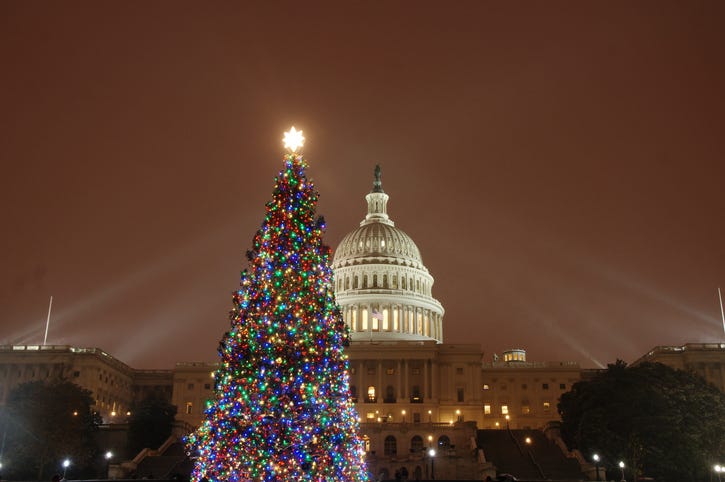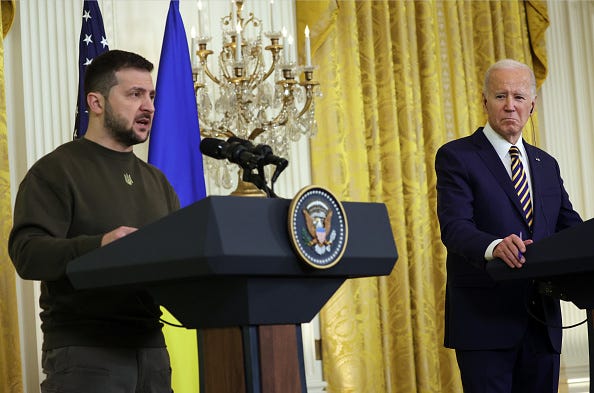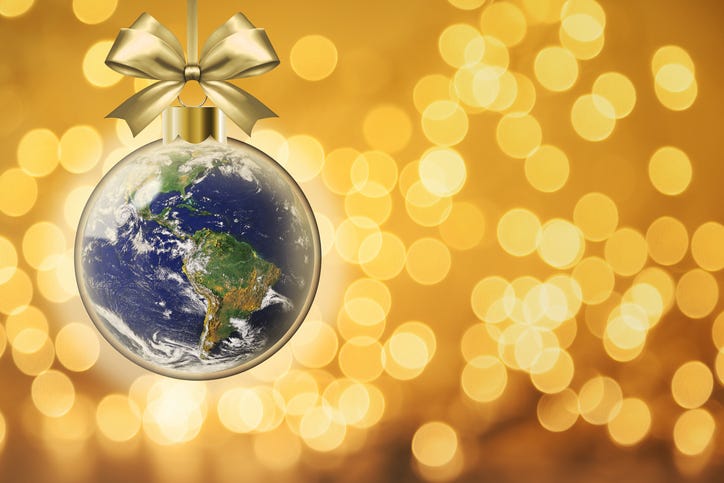Today’s midweek post at The Cottage looks at President Zelenskyy’s unexpected visit to Washington D.C. just a few days before Christmas — and the meaning of a “just peace.”
The essay begins below the picture of the Capitol Christmas Tree.
Don’t miss the DECEMBER SPECIAL at The Cottage. New and upgraded subscriptions are 10% off the regular rate until Christmas. Click the button below for information.
You can give The Cottage as a gift for the same special rate by clicking the “Give a Gift Subscription” button.
To celebrate the holidays, all paid subscribers will be entered in a gift giveaway drawing. On December 30, I’ll be gifting three pairs of “Life is Better at the Cottage” wineglasses (value: $30); two audio versions of my book Grounded (value: $40), and one set of signed books (value: $175) to SIX lucky paid subscribers.
When Christmas draws near, Washington, D.C. is typically quiet. Congress has adjourned; all the tourists have gone home. Those of us who live here ready for the holidays and hope for snow. At the end of December, we’re far more interested in a white Christmas than anything coming from the White House.
Not so this year. The usual winter silence has been overtaken by a flurry — nay, a blizzard — of news. In addition to a revelations regarding January 6, the release of former president Trump’s taxes, and last minute congressional budget and policy crises, there was a surprise visit to Washington by Ukraine’s president Volodymyr Zelenskyy.
Zelenskyy’s remarks in the White House press conference and his speech to Congress were moving and historic. Zelenskyy has emerged as a global hero for democracy — leading what most observers consider to be a just war, that is a defensive war against an unwarranted attack. Despite Ukraine’s successes against agression, and even while Russia continues to target civilians, Ukraine’s European neighbors and some American allies are increasingly pressing for peace.
President Biden included this hope for peace in his introductory remarks at the White House press conference. “President Zelenskyy, you have made it clear,” Biden stated, “that. . . you’re open to pursuing peace. You’re open to pursuing a just peace.”
That little phrase, “a just peace,” jumped out amid the usual diplomatic and political jargon. What is a just peace?
Ukrainian journalist Dmytro Anopchenko must have wondered the same — he followed up Biden’s remark and asked about the possibility for peace. President Zelenskyy replied:
What would you like to hear? A just peace? I don’t know. I don’t know what “just peace” is. It’s a very philosophical description. If there is a just war — I don’t know.
You know, for all of us, peace — just peace is different. For me, as the President, just peace is no compromises as to the sovereignty, freedom, and territorial integrity of my country, the payback for all the damages inflicted by Russian aggression.
I’m sorry, I’m reminding — I’m talking about children a lot today. But as a father, I would like to emphasize: You know how many parents lost their sons or daughters on the frontlines? So, what is just peace for them? Money is nothing. And no compensations or reparations are of no consequence. They live by revenge. I think this is a tremendous tragedy.
And the longer the war lasts, the longer this aggression lasts, there will be more parents who live for the sake of vengeance or revenge. And I know a lot of people like that.So there can’t be any just peace in the war that was imposed on us by these — I don’t know how to describe that because we are in the White House, and I can’t find the proper language — so these “inhumans,” I would say.
While Zelenskyy humbly dismissed any philosophical speculation on either just war or just peace, these comments offer a suggestive contrast to understand peace.
He described a “just peace” as that which restores what was taken by war — the right to self-government, the right to set one’s own course, the right to land, and the right to restitution. In more academic discourse, one might think of a “just peace” philosophically. Or, one could imagine “just peace” using the definition of “justify” found in printing — adjusting a text to reset the margins, to make the edges straight. Just peace resets that which was wrong. Zelenskyy’s remarks seems to fit in that second category.
And perhaps it is as simple as that. A just war is the morally-appropriate response to an unreasonable attack. A just peace resets the jagged edges of brutality, making right a people or nation torn by the most irrational sorts of violence. There can be no just peace without amends and repair. Anything less is not peace, and it is not just.
Zelenskyy also implied that a just peace can’t be based on “vengeance or revenge.” Vengeance, perhaps, turns the attacked into attackers, making innocent victims into the sort of “inhumans” (to use Zelenskyy’s own word) that launched the conflict in the first place. The longer the war goes on, Zelenskyy noted, the more his people desire revenge, something he clearly knows to be bad for Ukraine. The more people want retribution, the less possible any sort of peace — much less a just peace — becomes.
Just peace goes beyond restitution yet doesn’t seek retribution. A just peace is genuine repair and renewal, and it creates the possibility for all parties to be, at some level, reconciled and acknowledging the full humanity of the other. A just peace brings together victims and victimizers.
A just peace between nations could embrace the principles and practices of restorative justice, a peacemaking process largely developed since the mid-1970s and since promoted by social justice activists, psychologists and sociologists, medical researchers, and criminal justice reform advocates. To this point in history, it seems the widest application of restorative justice was South Africa’s Truth and Reconciliation Commission. It would be difficult to shape a peace process in a situation like the war in Ukraine, but such an imaginative possibility seems tantalizing in the hope for a “just peace.”
Perhaps a just peace is as historically elusive as a just war. Peace entails harmony, concord, a re-ordering of relationship between peoples to promote goodwill and security for all. Peace, especially a just peace, is more than an absence of war. It is hard work, and, it must be confessed, that even the best-intentioned peace is not perfect.
But retributive peace — a peace based on punishment — is the chilling alternative to a just peace. Any peace based on vengeance and revenge cannot succeed. Such a peace is fleeting, with only brief periods of quiet in cycles of payback and retaliation. A nation shaped by revenge will struggle to rid itself of such a feud, misshaping a democracy that continually undermines its own moral principles and ideals. The vision — and pursuit — of a just peace is not only a path to end a war, it is a way to limit the possibility of future wars.
Talk of a “just peace” didn’t make an appearance in President Zelenskyy’s speech to Congress. While there was a reminder of the benefits of peace, especially to children, it was equally clear that the president’s visit also strengthened the political case to Americans for more money and weapons to defeat Russia. His speech was emotional, stirring in its appeal to American history, and he drew in Christmas: “We’ll celebrate Christmas. Celebrate Christmas and, even if there is no electricity, the light of our faith in ourselves will not be put out.”
But, however timely the seasonal remark, it was also an odd juxtaposition — of needing missiles and celebrating Christmas.
As I listened, I almost wished he’d left out all of the references to Christmas. Wanting more guns (which is a reasonable thing for a man in his position) while speaking of the birth of the Prince of Peace seemed theologically discordant, an off-note in a significant address.
Although I’m not sure he (Zelenskyy is Jewish, not a Christian) or his speechwriter intended it, the tension between a just peace and a real war is the story of Christmas itself. Not, of course, the Christmas of family gathering and good cheer, but the deep message of God’s love born in a manger as announced by an angelic chorus: Glory to God in highest heaven, and peace on earth to those with whom God is pleased!
Yet the angel’s song — and Jesus’ nativity — doesn’t end Roman occupation of Jewish lands. The birth promises that the rich and powerful will be cast down, but they aren’t. It offers peace to all humankind (because all of God’s creation pleases God), yet violence even threatens the infant Prince of Peace with Herod’s edict of death. In the birth stories, peace and war are unholy twins.
Yet, Christmas is about the hope for a just peace — no, the reality of a just peace — a peace that resets the uneven edges of human history, a peace that reconciles violent relationships, and a peace that restores all that has been broken. The angelic chorus announces that God had come to dwell with human beings, a dwelling that cannot be destroyed by malevolent leaders or massive weaponry. God is with us, here. In all the muck and mess and murder.
The beautiful mystery and longing pain of this comes from our failure to understand, recognize, trust, and practice the nature of God’s just peace. When we dwell in our own twisted desires and when we put ourselves in God’s place, greed, sin, and evil displace that peace. A just peace has arrived and can never be dislodged from its rightful habitation among the peoples of the earth. Because God is with us.
Most of us will never struggle to believe in peace while bombs fall on our homes, when food runs short, and the cold of winter threatens our lives. Our struggles with the absence of a just peace are often more of more personal nature, in moral questions, philosophical speculation, or through difficult experiences.
Yes, it made me uncomfortable that Zelenskyy basically asked for more bombs in a Christmastime address. But that he can even think of — and even utter the word — “peace,” considering the fear and violence that he and his fellow citizens have survived, is a bit of a miracle. To hope amid horror, to reflect on the meaning of even the most impossible peace, is a profound human echo of that angelic song of so long ago. God’s dream. Isaiah’s vision. Jesus’ teaching and life.
I can say with President Zelenskyy, “A just peace? I don’t know.” I don’t know why it is this way, why peace is so hard, why this long hope — this divine reality — eludes us humans. A just peace? I might not know, but I trust. I trust that God intends a just peace for us all.
May this be a year that we all contribute to make a just peace real — for the people of Ukraine, in other places and situations of vengeance and violence, and in relation to our own misdeeds. May our lives always embody, however difficult it is to do so, the angel’s proclamation: Glory to God in highest heaven, and peace on earth to those with whom God is pleased!
INSPIRATION
I heard the bells on Christmas Day
Their old, familiar carols play,
And wild and sweet
The words repeat
Of peace on earth, good-will to men!
And thought how, as the day had come,
The belfries of all Christendom
Had rolled along
The unbroken song
Of peace on earth, good-will to men!
Till ringing, singing on its way,
The world revolved from night to day,
A voice, a chime,
A chant sublime
Of peace on earth, good-will to men!
Then from each black, accursed mouth
The cannon thundered in the South,
And with the sound
The carols drowned
Of peace on earth, good-will to men!
It was as if an earthquake rent
The hearth-stones of a continent,
And made forlorn
The households born
Of peace on earth, good-will to men!
And in despair I bowed my head;
"There is no peace on earth," I said;
"For hate is strong,
And mocks the song
Of peace on earth, good-will to men!"
Then pealed the bells more loud and deep:
"God is not dead, nor doth He sleep;
The Wrong shall fail,
The Right prevail,
With peace on earth, good-will to men."
— Henry Wadsworth Longfellow, “Christmas Bells”
Led by a star, a golden star,
The youngest star, an olden star,
Here the kings and the shepherds are,
Akneeling on the ground.
What did they come to the inn to see?
God in the Highest, and this is He,
A baby asleep on His mother’s knee
And with her kisses crowned.
Now is the earth a dreary place,
A troubled place, a weary place.
Peace has hidden her lovely face
And turned in tears away.
Yet the sun, through the war-cloud, sees
Babies asleep on their mother’s knees.
While there are love and home—and these—
There shall be Christmas Day.
— Joyce Kilmer, “Wartime Christmas”
What does peace do during
a wartime? Drink green
tea in her chill and unlit kitchen
with the news of the belligerent
muted on her east wall?
She prefers the glacial room
to send some shivers and needles
into her core. These days are
her sojourn, of her tarry reveries;
she sits sleepy sleeplessly;
her unborn sons in the conflict,
and the flight of her thoughts
wrecked nose-down amidst a firestorm.
Her tea has turned ice; it burns her tongue;
she has a ruin ready for the refugee words,
to resort to, and yet there comes none.
On her window sill, one bird lowers
a flapping mail. She turns her head
to see. A falcon? A dove may be?
— Author unknown (Ukrainian), “Pieced Cores Hold Together”







We anguished pray, someday peace can stay... till then the mad acquisition of territory has it's basis in expanding populations; greed as well yes, but human kind is expanding without birth limits. A fact we ignore at our peril. Somehow the sperm must find fewer eggs to grow humans or the world will kill itself, whether war, famine, disease, or simply polluting the earth with our chemicals, waste, and piles of trash. War is swift and deadly; over population is more deadly, just eons slower!
Diane
I sit in tears as I read your article and can only speculate how different things will be when all God’s people embrace the reality of , “The Kingdom of God is at hand”
Grace and Peace to all!
Phil